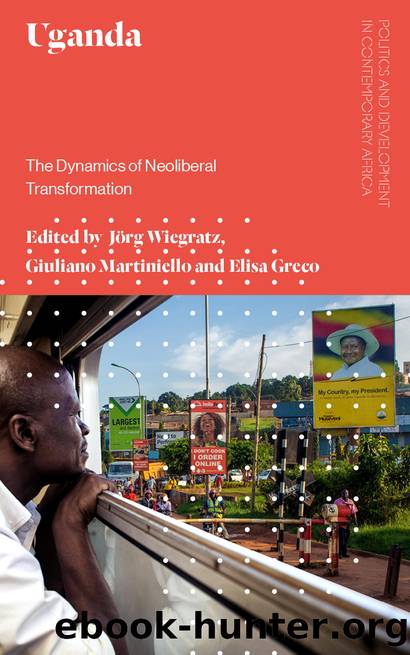Uganda by unknow

Author:unknow
Language: eng
Format: epub
ISBN: 9781786991119
Publisher: Book Network Int'l Limited trading as NBN International (NBNi)
Published: 2018-10-05T16:00:00+00:00
Part III
Extractivism and enclosures
10
Neoliberalism as Ugandan forestry discourse
Adrian Nel
Introduction
While colonialism was a hugely powerful territorialising force in Africa – instituting forms of the colonial state during a time of imperial expansion and mercantilist economic policy – neoliberal transformations since the 1890s have intensified modes of capital accumulation, value extraction and land use change in post-colonial Africa. In this context deforestation and agribusiness have become the foci of ‘green economy’ and green governance structures at a time when broader processes of intensification of land appropriations attendant to the globalisation of trade and investments are reshaping rural Africa (Fairhead et al. 2012). These processes culminate in part in increasing pressure to convert forests into various land uses such as for biofuels, and timber, pulp and paper, and agribusiness plantations (Mwangi and Wardell 2012: 341). In Uganda there has been, according to Martiniello (2012), a mushrooming of land grabbing and evictions, and localised struggles of resistance are daily reported by media and civil society activists in the central as well as western and northern regions, which were traditionally marginal in the colonial and post-colonial political economy; these have been no less prevalent in the forestry sector (Anti-Corruption Coalition Uganda 2010). In describing how this happens in places such as Uganda, it has been argued there is a need for critical scholars to locate the ecological and socio-economic significance of processes of commodification of nature within their broader discursive, historical and political economic dynamics (Arsel and Büscher 2012: 68). This approach is crucial in order to understand how many of the problems in the Ugandan forestry sector do not beset it ‘from the outside’, but are, if not intentional, derived from a neoliberal logic which externalises social and environmental costs, and stymies alternatives. This chapter takes up the call to critical scholarship by analysing neoliberal forestry discourse which circulates and transforms forestry management practice and governance.
Forests in Uganda are intimately anthropogenic, and have been involved in the co-production of the Ugandan landscape alongside its people. Forests were entwined in pre-colonial systems of ecological control and agrarian use (Doyle 1998), and have been estimated to support, directly or indirectly, approximately 23.42 per cent of Uganda’s GDP and 65 per cent of its employment (World Bank 2011). They are perceived as cultural sites, ‘sacred groves’ and houses of ancestral spirits by some (UFRIC 1999), and interpreted by the colonial and post-colonial governments as sites of extraction and state formation (Cavanagh and Himmelfarb 2013), whilst at the same time the de jure protected areas and reserves that eventuated from state enclosure were seen as a source of ‘empty land’ for landless people, migrants and displaced peoples from the civil wars and beyond (Marquardt 1994). It is evident that forestry spaces in Uganda are inherently contested, and enwrapped with uneven development, increasing population pressure and the political economy of resource management (Mwenda and Tumushabe 2011). However, rather than leading to a questioning of the territoriality of the protected forest estate itself or its uneven access regimes (with privileged
Download
This site does not store any files on its server. We only index and link to content provided by other sites. Please contact the content providers to delete copyright contents if any and email us, we'll remove relevant links or contents immediately.
Blood and Oil by Bradley Hope(1246)
Daniel Holmes: A Memoir From Malta's Prison: From a cage, on a rock, in a puddle... by Daniel Holmes(1117)
Ambition and Desire: The Dangerous Life of Josephine Bonaparte by Kate Williams(1084)
Wandering in Strange Lands by Morgan Jerkins(1014)
It Was All a Lie by Stuart Stevens;(940)
What Really Happened: The Death of Hitler by Robert J. Hutchinson(868)
London in the Twentieth Century by Jerry White(844)
Time of the Magicians by Wolfram Eilenberger(842)
The First Conspiracy by Brad Meltzer & Josh Mensch(811)
Twilight of the Gods by Ian W. Toll(811)
A Woman by Sibilla Aleramo(796)
The Japanese by Christopher Harding(795)
Lenin: A Biography by Robert Service(778)
The Devil You Know by Charles M. Blow(777)
Reading for Life by Philip Davis(774)
Cleopatra by Alberto Angela(764)
Twelve Caesars by Mary Beard(764)
1965--The Most Revolutionary Year in Music by Andrew Grant Jackson(714)
The Life of William Faulkner by Carl Rollyson(713)
